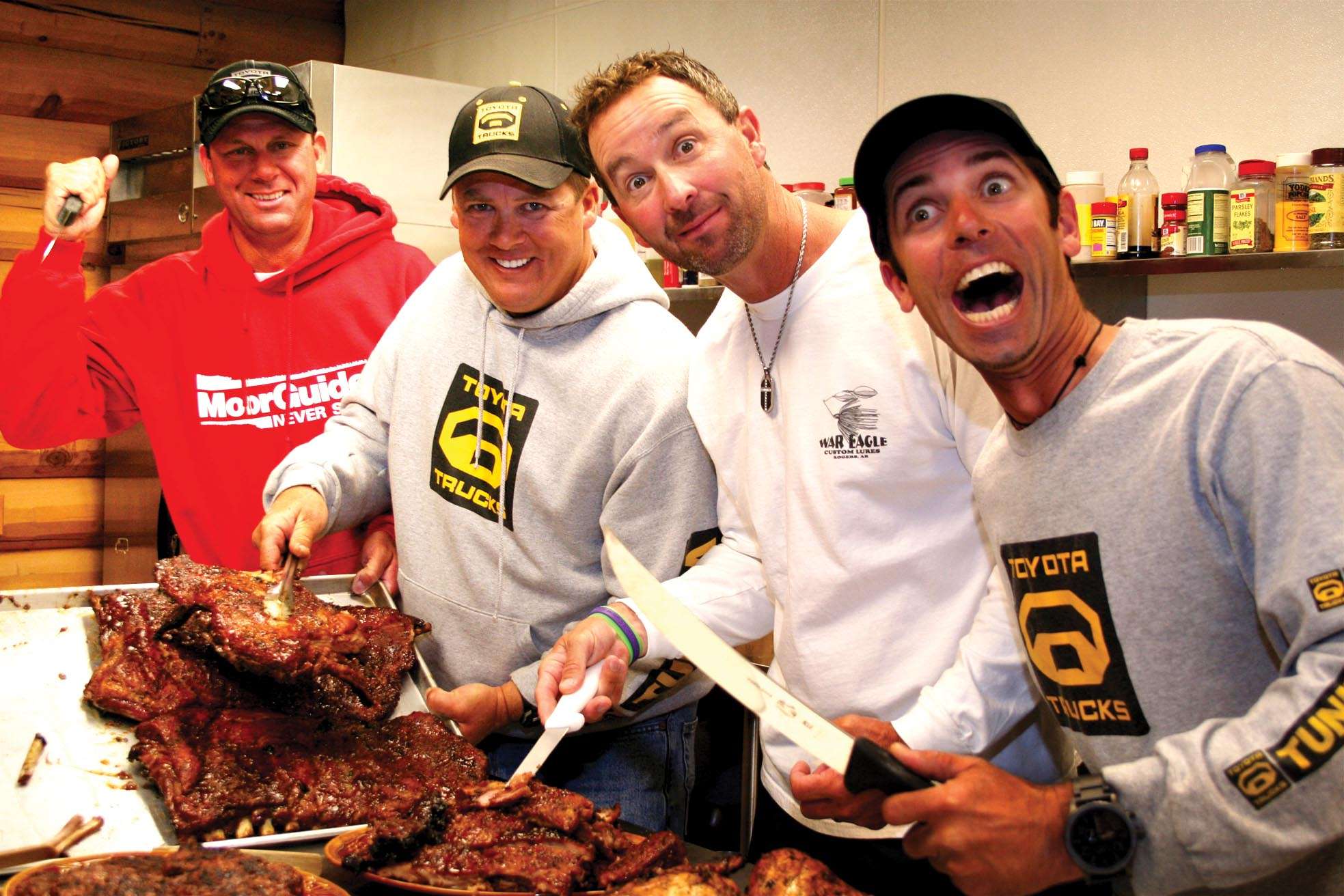
Editor’s Note: Bassmaster Magazine can be viewed in its entirety on Digital Bassmaster.
It’s long past midnight, and Brandon Palaniuk has the rock music blaring. He’s been driving all night, and he has three more hours to go. He pops open a Red Bull and takes a deep swig. It’s a liquid jolt. It’ll help him stay awake to make it to his destination, a state park campground at the next tournament site. This is one more leg in his first season on the Bassmaster Elite Series circuit, and 23-year-old Palaniuk is living his dream.
So are Gerald Swindle and Mike Iaconelli, two veterans on the Elite Series circuit. They are headed to the same place as Palaniuk, but their lifestyles on the road are different from the rookie’s. Their time away from home is as “homey” as they can make it, with spousal support and guest houses and home-cooked meals. Such amenities help them relax when they’re not on the water and focus better when they are.
Road warriors! The Elite Series anglers live on the go. They are nomads for much of the year, driving unthinkable distances from one tourney location to the next. To them, “normal life” is another few hundred miles and another mug of truck stop coffee. They juggle family and business commitments with their determination to get there, find the fish, earn a check, add more Classic points and move on. Theirs is life in the fast lane, both on the highway and on the water.
So, how do they do it? What are their challenges? What are the downsides and the rewards? How lonely do they get? How tired? How does the grind of their schedule affect them physically and psychologically? Why do they do it?
Here is a look at how Palaniuk, Swindle and Iaconelli manage their lives in pursuit of the brass ring — or the bass ring. They live to fish, and they fish to live. They endure a lot to satisfy their competitive urge, and each man has his own unique system for coping and getting along. Here’s how they manage their unique lifestyles to do what they love to do.
Brandon Palaniuk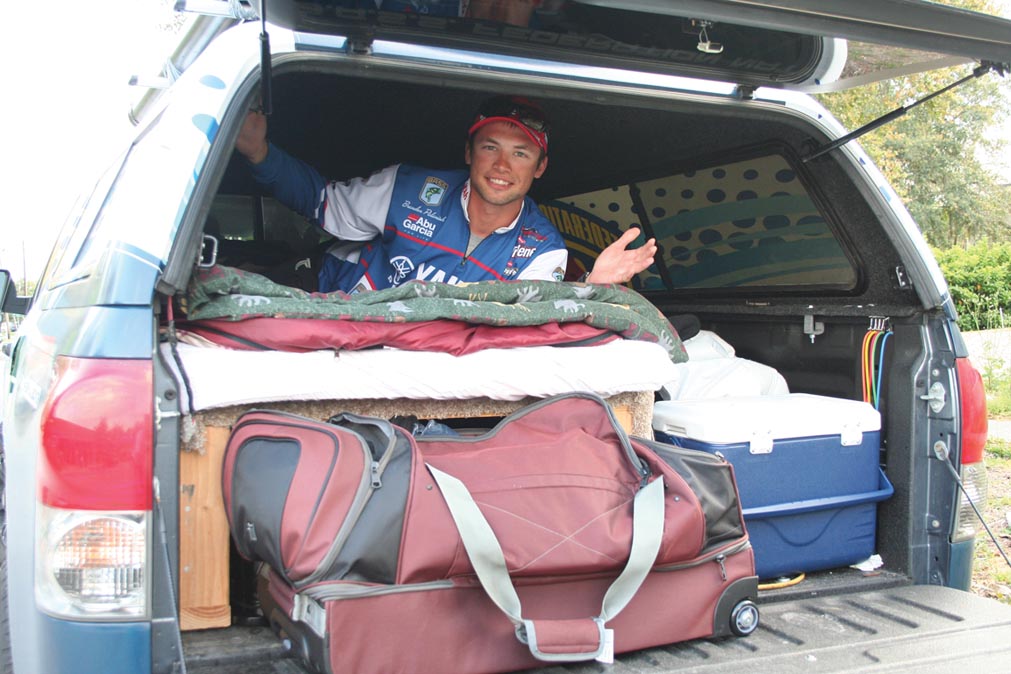
In October 2010, Palaniuk of Rathdrum, Idaho, won the B.A.S.S. Federation Nation Championship, thereby qualifying for the 2011 Bassmaster Classic and the Bassmaster Elite Series circuit in the following season. So, after fishing the Classic on the Louisiana Delta (and finishing fourth!), Palaniuk hit the Elite Series trail last February. He has now lived a full year as a touring pro and qualified for his second Classic. In the process, he has figured out how to travel and economize to sustain the pursuit of his dream.
“This past year, I was on the road almost constantly for six months,” Palaniuk says. “I left New Orleans immediately after last year’s Classic, and I didn’t get back home until May 25. Then I stayed only 10 days, and I was gone again. I drove around 42,000 miles total. I spent close to $8,000 on gas. The biggest challenge I faced was being away from my family and friends. I left everything behind, and I was a long way from home. Being gone was the hardest part.”
At most events, Palaniuk slept in the back of his topper-covered Toyota Tundra pickup truck. “I have an elevated 2 x 4/plywood bed frame that’s covered with a 4-inch memory foam mattress and sheets and blankets. I slept as well in the truck as I would have in a house or a motel. I keep a small dresser in the truck for my clothes and personal items. I store cooking equipment and other gear under the bed. I cooked on the pickup’s tailgate. I showered in state park bath houses or truck stops. I even bathed in the lake a few times.”
During much of the season, Palaniuk’s sister, Brianna, followed him in her car and slept in a tent pitched next to his truck. “She did a lot of the cooking. We’d eat as healthy as we could: steaks, fish, salads, stuff like that. We don’t like eating fast food. Also, she did the laundry and made lunches for me and handled other chores. This allowed me to focus on my fishing and get to bed early after a long day on the water.”
After Brianna returned to Idaho, besides camping, Palaniuk also shared a rental house with fellow pros Casey Ashley, Jonathon VanDam and Marty Robinson. On occasion, he also bunked in with Federation Nation friends who lived near tournament sites.
And the long drives between tournament sites? “I’d enjoy the drives,” he says. “During a tournament, there’s no mental downtime. You’re always concentrating on fishing or talking to fans or sponsors. But when I’m on the road, I can let my mind slow down. I usually pop in a rock or country CD, set the cruise control and watch the countryside roll by. Now, this is about the only time I get to relax.”
Gerald Swindle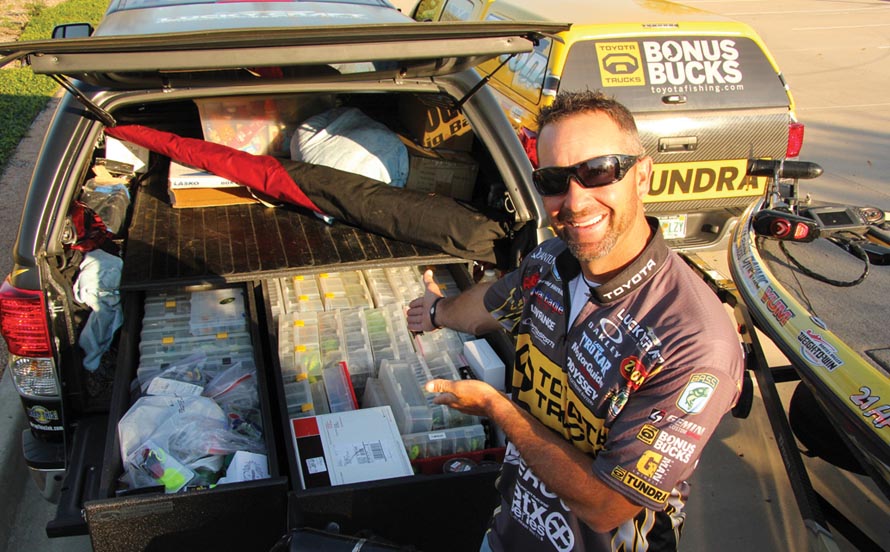
Swindle of Warrior, Ala., has fished the Bassmaster tournaments professionally for 14 years. He is one of the most popular and successful pros on the tour (he won the Bassmaster Angler of the Year award in 2004). He travels with his wife, Le Ann, who shares driving duty and handles family business matters. They also take their Weimaraner, Myrick, when they hit the road.
“We average 240 to 280 days away from home each year,” Swindle says. “When we’re driving, Le Ann and I listen to audio books, spiritual tapes and motivational CDs to help pass the time and get my mind off fishing. We try not to drive more than 12 hours a day for safety’s sake. If our trip is over 12 hours, we’ll stop along the way to get a good night’s rest.”
Swindle is known for being an organizational freak. “My wife says I’m the pickiest packer in the world,” he says, laughing. “I utilize every square inch of our pickup. Our truck is our home and our office. I can’t afford to be haphazard about what I take and how things are stored. I have built-in, roll-out drawers in the bed of my truck that hold my tackle. Then I store our clothes and other gear on top of and around the cabinet.”
Swindle’s pickup bed is a mini-storeroom: spare trolling motor, outboard prop and hubs, trailer bearing kits, sonar units, etc. He carries a box fan (makes “quiet noise” for better sleeping), coffeemaker, complete tool kit, floor jack, 8 gallons of outboard oil — you name it. He believes in being ready for any emergency or lost or broken piece of equipment.
“One thing we do is, when we know we’re staying overnight at a motel, we’ll pack one small bag with a change of clothes and our toilet items, and we’ll put this bag on top of everything. This way, when we stop for the night, we can grab that one bag and go in without having to unload a lot of other stuff.”
The Swindles stay in rental houses at tournament sites, teaming up with regular house partners Terry Scroggins and Britt Myers. “We’re like a little family,” Swindle says. “Le Ann cooks for everybody, and she makes lunches and fills our thermoses with coffee. It’s as close to home as we can get. It’s better than staying in a hotel.”
Has Swindle ever had a wreck or encountered a dangerous situation while traveling? “No wrecks, thank the Lord,” he answers. “But I was in a gas station once when a guy tried to rob the place. We got him. He just had a knife. You won’t get far pulling a knife on a redneck.”
What’s the hardest part of being on the road so much? “Missing home,” Swindle says, “and sitting on a wooden pew on Sunday morning with my arm around my wife. We try to stop for church services on the road when we can.”
And the best part of being a touring bass pro? “Living my dream; loving my job. And I also love the freedom of this lifestyle. I’m just trying to leave a positive track in the sand.”
Michael Iaconelli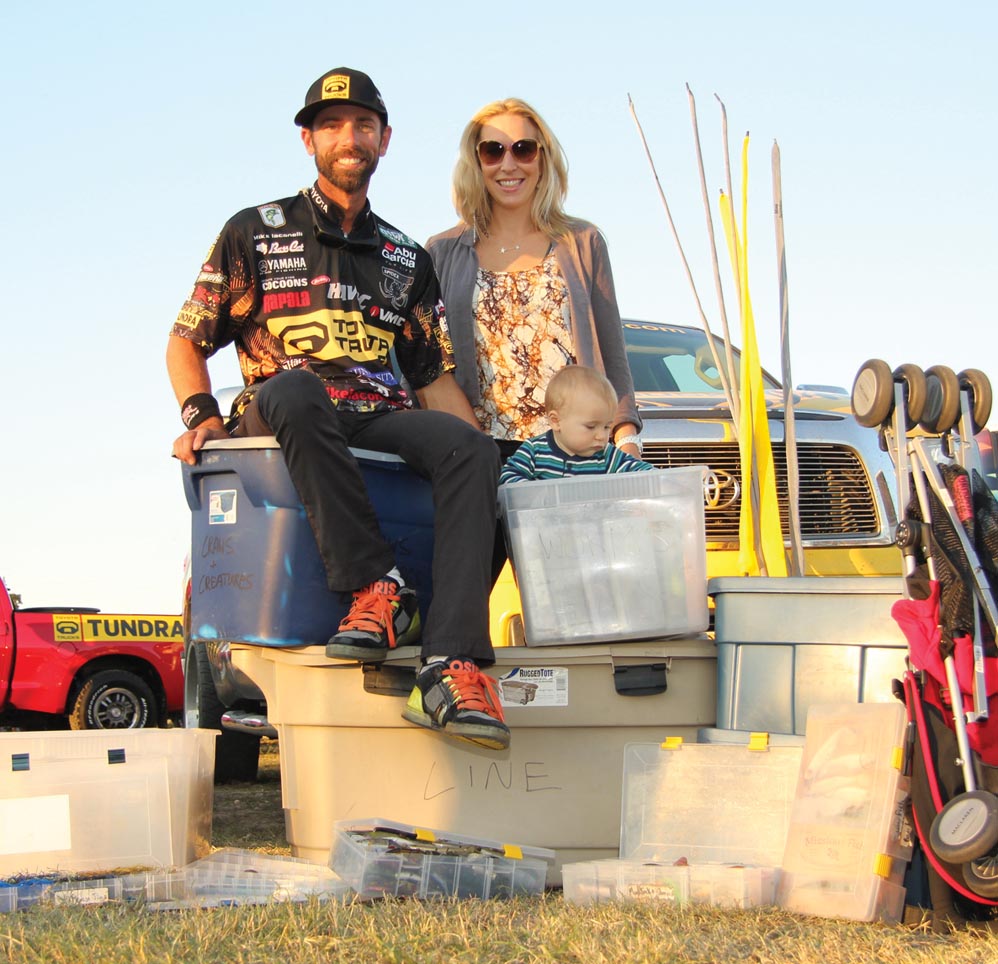
Iaconelli lives in Pittsgrove, N.J. He won the Bassmaster Classic in 2003 and Angler of the Year in 2006. This 15-year Bassmaster veteran is one of the most recognizable faces on the tour. He relishes his vagabond lifestyle, the competition of tournaments and the camaraderie of like-minded friends.
“I spend around 250 days of actual travel each year, and I drive 30,000 to 40,000 miles each season,” Iaconelli says. “And travel is a little different for me. New Jersey is a long haul from most places where we fish, and it’s hard for me to get back home between tournaments. So, when I head out in late winter, I’m usually gone several months straight.”
Because of this, Iaconelli is meticulous in packing his truck for a new season. “I make checklists and follow them to the letter,” he says. “I carry spare everything. I have a big Rubbermaid storage box full of anything I can think of that I might need in an emergency. I also make sure my truck and rig are in tiptop shape. When we pull out in February, we’re leaving home base, and we do so knowing that we can meet just about any situation that might arise.”
Iaconelli travels with his wife, Becky, and infant son, Vegas. His daughters from a previous marriage, 13-year-old Drew and 11-year-old Rylie, join them when school is out in the summer. The Iaconellis typically stay in rented homes at tournament sites, sharing accommodations with fellow pros Ish Monroe and John Crews. “We’re like an extended family, like home away from home,” Iaconelli says. “This arrangement provides a bigger support network. Everyone fills his own niche, and we support each other when support is needed.
“It’s great to return to a house, home-cooked meals and family and friends after a day of fishing. I think it’s the best arrangement for keeping some sense of normalcy in our lives.”
Sometimes during long drives between tournament sites, the Iaconellis become tourists. “For us, it’s not always rush, rush, rush,” Iaconelli says. “We’ll stop along the way to see things. Once we visited the Grand Canyon and Santa Fe, N.M., while driving from California to Texas. If there’s something interesting to see, we’ll stop and check it out.”
Iaconelli and his wife have never had a serious emergency on the road, but they have encountered a number of blizzards, high winds and one tornadic frontal passage that pelted them with hail large enough to dimple their truck’s hood and break the windshield.
Iaconelli says, “Technology has made being on the road easier. We can always stay in touch with family and friends with cellphones, Skype and the Internet. It’s not like being home, but it’s better now than it used to be.
“Being on the road so much is tough, but for us, the positives outweigh the negatives. Living like this isn’t all roses, but we love what we do, and we just figure out ways to make things work.”
How these road warriors organize their tackle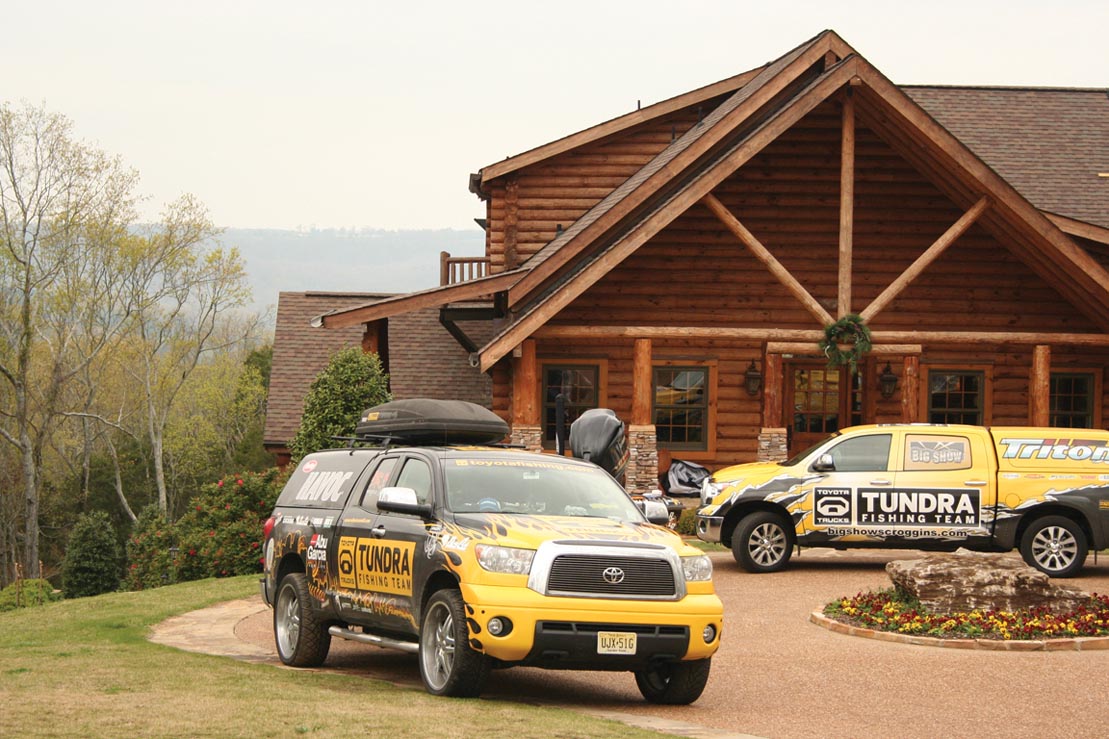
One big challenge that touring bass pros face is tackle management. How do they anticipate what they will need on the tournament trail? What do they carry, and how do they organize and store their rods, reels and lures for the road? Here is a glimpse at how Brandon Palaniuk, Gerald Swindle and Mike Iaconelli accomplish this task to facilitate simplicity and efficiency as they travel the U.S. in search of bass.
Palaniuk — “I have a large storage pod on top of my pickup, and I keep my baits in plastic bins in this pod. I keep all my soft plastics in Ziploc bags, labeled as to type and color. These go in one bin. I keep my hard baits organized the same way in another bin. I slide some other tackle under my bed in the back of the truck. I keep my rods in the rod locker of my boat and a few spares in the truck bed. I work hard to keep everything very organized so I can find replacements when I need them.”
Swindle — “I store most of my tackle in a roll-out tacklebox drawer system in the back of my truck. I’m organized almost to a fault. I keep baits separated by category and stored in Plano storage boxes. On one side of my roll-out I have deep-diving crankbaits, then I work forward with shallow crankbaits, lipless crankbaits, jerkbaits and topwaters. On the other side I keep all of my soft plastics. I don’t get too crazy with colors. In crankbaits, I carry mostly shad and chartreuse variations. I carry four or five basic colors of worms and craws and other soft plastics. I think simplicity is important so you don’t get mind-boggled. And if a bait rides in my truck for a couple of years and doesn’t get used, I’ll take it out. I keep most of my rods in my boat, but I’ll keep spares in one of the tackle drawers, along with spare reels. I keep the reels in their original boxes — real neat.”
Iaconelli — “I store most of my baits in large plastic storage tubs that I stack in the back of my pickup. I store soft plastic baits in gallon-size Ziploc bags. Each bag is labeled according to its specific contents — creature baits, tubes, worms, trailers, etc. — so I can find a specific bait quickly. I store my hard baits in Plano 3700 storage boxes. These are handy because they stack vertically. I keep my crankbaits, jerkbaits and topwaters in one big tub. The nice thing about this system is that I can store, stack and change out these boxes easily. When I’m using one particular type of lure in a tournament, I can switch those boxes around for greater accessibility. I carry my other tackle in a Thule cargo topper on top of my pickup. This is where I carry all my spare rods. I carry two backups for every rod I’m using. I’ll always have 30 or so rods in storage. This is also where I keep things like spare marker buoys, culling equipment, etc. On the road, we’re a mobile tackle store!”
